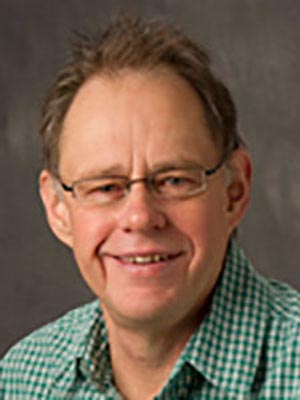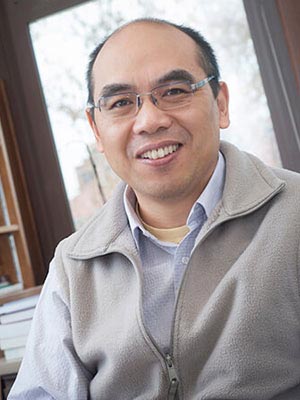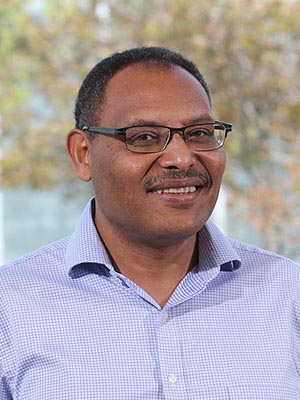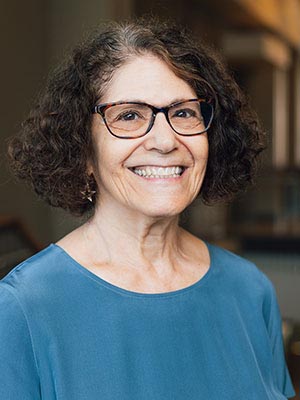April 19, 2024
Purdue faculty chosen as fellows of the American Association for the Advancement of Science

WEST LAFAYETTE, Ind. — Four Purdue University faculty members have been elected as 2023 fellows of the American Association for the Advancement of Science (AAAS), one of the highest national distinctions within the scientific community. The select fellowship recognizes distinguished achievement among scientists whose work has advanced science or its applications.
This year AAAS elected Trevor Anderson of the College of Science; Songlin Fei and Tesfaye Mengiste, both in the College of Agriculture; and Ronnie Bring Wilbur jointly of the College of Health and Human Sciences and the College of Liberal Arts.
“These esteemed faculty are exemplars for Purdue’s standard of excellence,” said Karen Plaut, executive vice president for research. “They set a high bar for themselves, their peers and their students. Purdue joins with AAAS in recognizing these four faculty members, whose achievements also contribute to Purdue’s reputation for excellence in research and teaching.”
Trevor Anderson
 Trevor Anderson
Trevor Anderson
Download image
Trevor Anderson, retired emeritus professor in the Department of Chemistry, is a biochemist and biochemistry education researcher who previously served in the divisions of chemical education and biochemistry.
The AAAS attributed his fellowship election to his “distinguished work in biochemistry education research, especially focused on molecular visualization and systemic education reform in chemistry and biology education internationally.”
During three decades of science education research, Anderson graduated numerous doctoral and master’s students across a wide range of education disciplines, including biochemistry, chemistry, biology, molecular biology, microbiology, physics and mathematics. He was well known for his workshops on biochemistry instruction, his design of curriculum-change models, and his authorship of the Bridging-the-Gap series in the journal Biochemistry and Molecular Biology Education aimed at encouraging scholarship in teaching and learning through the application of educational research to teaching practice.
Anderson’s Science Education Research Group (SERG) at the University of KwaZulu-Natal, South Africa (for 27 years) and his Visualization in Biochemistry Education (VIBE) research group at Purdue (for 10 years) fostered productive international collaborations with colleagues in the U.S., the U.K., Australia, Sweden, South Africa, Portugal, Brazil and Argentina.
Songlin Fei
 Songlin Fei
Songlin Fei
Download image
Cited by the AAAS for his “distinguished contributions in bringing 21st century advances in digitization to forest science,” Songlin Fei has gained distinction for his use of data science and digital technologies to explain complex natural systems and foster sustainability of natural resources.
Fei, professor and Dean’s Chair for Remote Sensing in the Department of Forestry and Natural Resources and director of the Institute for Digital Forestry, is a quantitative ecologist. His research has significantly advanced the ecology and management of invasive species, the understanding of forest responses to climate change, and the modernization of forestry into the digital age. Fei’s greatest strengths are his abilities to conduct research across disciplinary boundaries and to make innovative discoveries to address applied natural resource problems.
As director of the Institute for Digital Forestry, Fei leads efforts aiming to revolutionize forestry from labor-intensive, manual methods to an effective, precise, digital system by testing and adopting existing digital tools and by developing new tools, algorithms and platforms for precision forest management and for public health improvement and mitigation.
Tesfaye Mengiste
 Tesfaye Mengiste
Tesfaye Mengiste
Download image
Tesfaye Mengiste, professor and head of the Department of Botany and Plant Pathology in the College of Agriculture, works to crack the molecular code on mechanisms intrinsic to plant disease resistance. His goal is to help sustain the world’s food supply by breeding plants that have resistance to disease in their genetic makeup. In electing Mengiste for a fellowship, AAAS cited him for “distinguished contributions to the field of plant immunity against fungal pathogens, particularly against necrotrophic pathogens.”
Mengiste led the Purdue research team that made the highly significant discovery of a single gene in sorghum named ARG1 (Anthracnose Resistance Gene1), which confers broad protection from the fungal diseases anthracnose, rust and target spot. He also studies genetic regulators of plant resistance and their functions in the plant Arabidopsis and in tomato.
Through genetic, molecular and biochemical approaches, he is determining how selected components regulate plant immune responses to fungal resistance and is examining how plants activate immune gene expression and other mechanisms plants trigger to resist or limit damage caused by plant pathogens. Together, research in the Mengiste lab generates scientific knowledge and a foundation that will ultimately support breeding of crops resistant to pathogens, thereby boosting productivity. In parallel, he is working to directly translate some of the findings into genetic improvement of crops.
Ronnie Wilbur
 Ronnie Wilbur
Ronnie Wilbur
Download image
Ronnie B. Wilbur, professor in the Department of Speech, Language, and Hearing Sciences in the College of Health and Human Sciences, and professor in the Department of Linguistics in the School of Interdisciplinary Studies in the College of Liberal Arts, specializes in language and deafness and in the structure of American Sign Language (ASL) and is an authority on how sign languages compare to spoken languages.
The AAAS cites Wilbur’s “distinguished contributions to the field of linguistics, particularly the syntax of American Sign Language.”
Wilbur has investigated literacy problems of school-age deaf children and has documented how deaf children’s sign language knowledge does not interfere with English acquisition; her research has shown that the single best predictor of deaf children’s ultimate educational outcomes is their fluency in ASL. She also has investigated the interaction of ASL sentence structure with event structure and discourse/pragmatic functions, as well as nonmanual markers, such as blinks, brow raises and head nods, which she has shown perform the same function as spoken language morphemes in the syntax and semantics of sign languages.
Over the decades, she has been funded by NSF and NIH for her work on techniques for automatic sign language recognition with computer-vision faculty (Avinash Kak and Jeffrey Siskind, both professors of electrical and computer engineering at Purdue, and Aleix Martínez of Amazon). She has also been funded by NSF for research on Croatian Sign Language and by the Department of Education for research with Nicoletta Adamo, professor in computer graphics technology in the Purdue Polytechnic Institute, to develop ASL software for the education of deaf children in mathematics.
Writer/Media contact: Amy Raley, araley@purdue.edu

